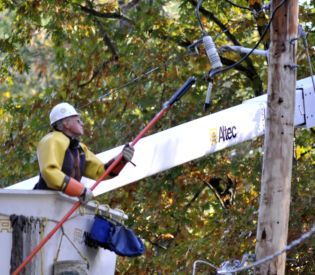
Charged up for a power play
Time to strike blow vs. Big Electricity

By Margery Eagan
Sunday, November 6, 2011
If you’re still furious with Nstar, National Grid, Western Massachusetts Electric, Unitil or whichever utility company left you freezing in the dark this week, take heart. Getting even with the mega-millionaires who run these monopolies is not as hard as you think.
But you have to do something: Make competition possible.
Here’s how.
Pick up the phone tomorrow and call 617-722-2000, the State House. Demand that your legislator support passage of House Bill 869, a bill that’s been filed repeatedly but kicked around Beacon Hill for a decade.

PLUGGING AWAY: An electric company worker tends to a utility pole in Sudbury this week, as efforts to restore power continued. Photo by Ted Fitzgerald
This bill would ease the way for towns to start their own competing electric companies — something the above monopolies, naturally, do not want.
Then demand this — which is crucial: evidence of legislators’ support. They need to prove they’re not just saying one thing, doing another.
And if they won’t do it, you must assume the mega-millionaires at the monopolies bought their support. That’s harsh and cynical, I know. But we’ve earned our cynicism around here.
State Rep. Jay Kaufman of Lexington, who lost his own power for three days, has repeatedly filed the so called “muni” bill “relative to the establishment of municipal lighting authorities.”
There are 41 towns in Massachusetts with their own munis. “In this storm and in every preceding storm,” Kaufman said, those towns — which include Wellesley, Concord, Hull, Reading and Mansfield — have had better service, fewer outages and quicker responses than towns served by the big utilities.
Plus, the munis rates are cheaper by a third. That’s no surprise, since nobody at a muni is a mega-millionaire, such as Tom May, who runs Nstar for $8 million a year.
Why, then, don’t more towns start munis? Says Kaufman: “Because in 1920 a law was passed that effectively makes it impossible for new munis.” Basically, it allows big utilities to veto new munis, which explains why there were 41 in 1920 and 41 today.
Competition, see, is bad for the big utilities, but good for you, your neighbors, ripped-off ratepayers and the beautiful trees you might not have lost had somebody trimmed them in time.
At least 20 state legislators support House Bill 869. (Their names are listed on the website for MAMEC, the municipal group that’s pushing the law). But that leaves dozens of legislators who don’t.
Maybe this is because Nstar, National Grid, Unitil and Western Mass. Electric have spent nearly $5 million since 2005 lobbying against munis — and $5 million can be very persuasive.
Let’s face it, if yours is one of those rogue legislators, the only way to make sure they don’t sell you down the river — again — is to chase them down like roaches in the night.
The beauty of this bill? Just passing it makes competition with big utilities a possibility, whether anyone creates a new muni or not. That alone provides an incentive to keep customers happy and their rates low, something big utilities haven’t had to worry about for 92 years.
I think it’s time for a change.
